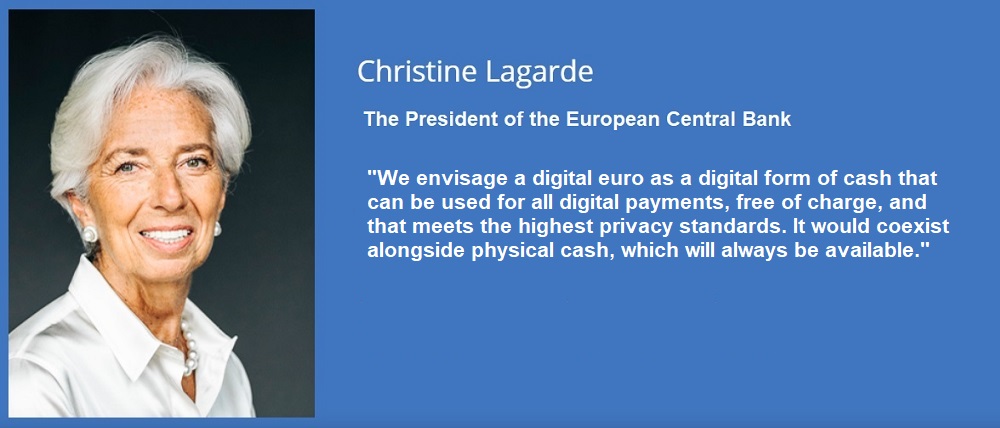
The Governing Council of the European Central Bank (ECB) decided today to move to the next phase of the digital euro project: the preparation phase.
This decision follows the completion of the investigation phase launched by the Eurosystem in October 2021 to explore possible design and distribution models for a digital euro. Based on the findings from this phase, detailed in a report published today, the ECB has designed a digital euro that would be widely accessible to citizens and businesses through distribution by supervised intermediaries, such as banks.
The design envisages the digital euro as a digital form of cash that could be used for all digital payments throughout the euro area. It would be widely accessible, free for basic use and available both online and offline. It would offer the highest level of privacy and allow users to settle payments instantly in central bank money. It could be used from person to person, at the point of sale, in e-commerce and in government transactions. No digital payment instrument offers all these features. The digital euro would fill that gap.
„The next phase of the digital euro project – the preparation phase – will start on 1 November 2023 and will initially last two years. It will involve finalising the digital euro rulebook and selecting providers that could develop a digital euro platform and infrastructure. It will also include testing and experimentation to develop a digital euro that meets both the Eurosystem’s requirements and user needs, for example in terms of user experience, privacy, financial inclusion and environmental footprint.” according to the press release.
The ECB will continue to engage with the public and all stakeholders during this phase. After two years, the Governing Council will decide whether to move to the next stage of preparations, to pave the way for the possible future issuance and roll-out of a digital euro.
The launch of the preparation phase is not a decision on whether to issue a digital euro. That decision will only be considered by the Governing Council once the European Union’s legislative process has been completed. The ECB will take into account any adjustments to the design of the digital euro that may become necessary as a result of the legislative deliberations.
“We need to prepare our currency for the future,” said Christine Lagarde – President of the ECB. “We envisage a digital euro as a digital form of cash that can be used for all digital payments, free of charge, and that meets the highest privacy standards. It would coexist alongside physical cash, which will always be available, leaving no one behind.”
The digital euro would make data protection a priority. The Eurosystem would not be able to see users’ personal data or link payment information to individuals. The digital euro would also achieve a cash-like level of privacy for offline payments.
The digital euro would promote resilience, competition and innovation in the European payments sector. It would ensure that there is a pan-European payment solution for the euro area under European governance. It would rely on its own infrastructure, thereby strengthening resilience. And it would provide a platform on which European supervised intermediaries could build pan-European services for their customers, increasing efficiency, reducing costs and fostering innovation.
“As people increasingly choose to pay digitally, we should be ready to issue a digital euro alongside cash,” said Fabio Panetta, ECB Executive Board member and Chair of the High-Level Task Force on a digital euro. “A digital euro would increase the efficiency of European payments and contribute to Europe’s strategic autonomy.”
Users could access digital euro services via their payment service provider’s proprietary app and online interface, or via a digital euro app provided by the Eurosystem. People without access to a bank account or digital devices would also be able to pay with digital euro, for example by using a card provided by a public body such as a post office. Users would also be able to exchange digital euro for cash or vice versa at cash machines.
The Eurosystem envisions a digital euro that would be free for basic use for individuals. A compensation model between intermediaries and merchants would ensure that there are incentives for intermediaries to distribute digital euro, as is the case for other electronic payment instruments, and that there are adequate safeguards against excessive service charges for merchants. The Eurosystem would bear its own costs, including those related to scheme management and settlement processing.
Transparency and close cooperation with stakeholders remain key pillars of the project. The Eurosystem has benefited greatly from feedback from European decision-makers, market participants and potential users, and will continue to engage actively with a wide range of stakeholders. We will also continue to cooperate closely with EU legislators.
Proposal for a Regulation of the European Parliament and of the Council on the establishment of the digital euro, European Commission, COM(2023) 369 final, 28 June 2023; and Proposal for a Regulation of the European Parliament and of the Council on the provision of digital euro services by payment services providers incorporated in Member States whose currency is not the euro and amending Regulation (EU) 2021/1230 of the European Parliament and the Council, COM(2023) 368 final, 28 June 2023.
The Eurosystem has established a digital euro scheme Rulebook Development Group to support the drafting of a single set of rules, standards, and procedures for the digital euro. The Group is composed of Eurosystem staff and market representatives who provide input from the financial industry, consumers and merchants.
Banking 4.0 – „how was the experience for you”
„To be honest I think that Sinaia, your conference, is much better then Davos.”
Many more interesting quotes in the video below: